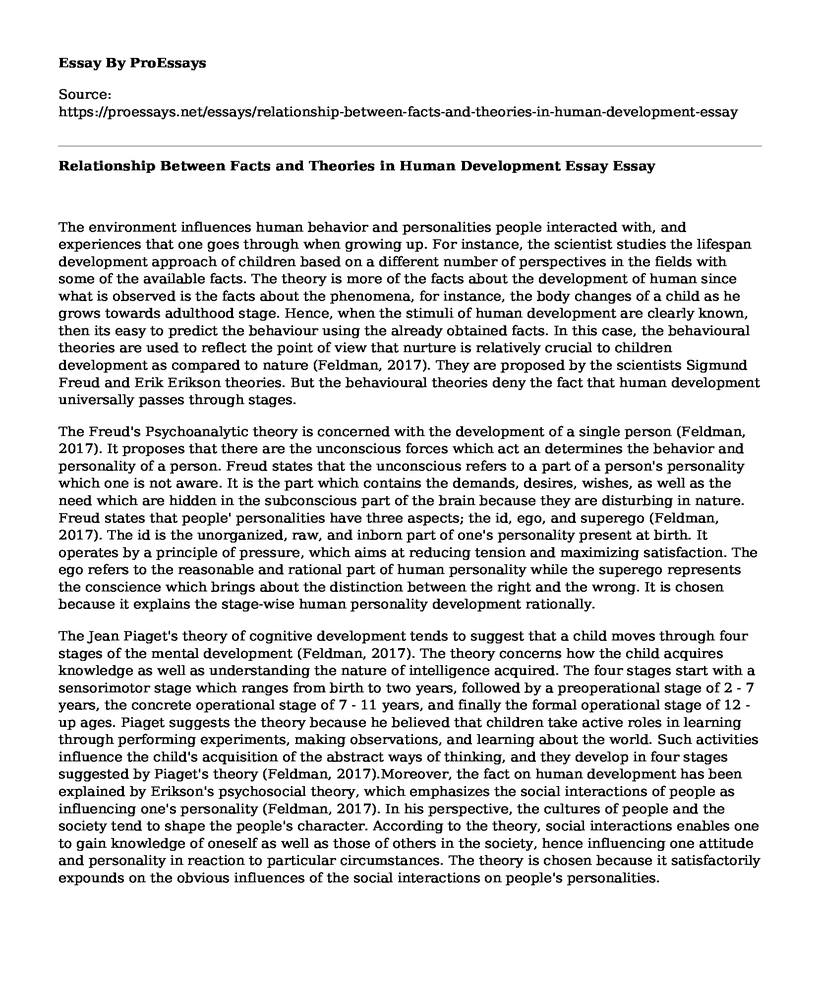The environment influences human behavior and personalities people interacted with, and experiences that one goes through when growing up. For instance, the scientist studies the lifespan development approach of children based on a different number of perspectives in the fields with some of the available facts. The theory is more of the facts about the development of human since what is observed is the facts about the phenomena, for instance, the body changes of a child as he grows towards adulthood stage. Hence, when the stimuli of human development are clearly known, then its easy to predict the behaviour using the already obtained facts. In this case, the behavioural theories are used to reflect the point of view that nurture is relatively crucial to children development as compared to nature (Feldman, 2017). They are proposed by the scientists Sigmund Freud and Erik Erikson theories. But the behavioural theories deny the fact that human development universally passes through stages.
The Freud's Psychoanalytic theory is concerned with the development of a single person (Feldman, 2017). It proposes that there are the unconscious forces which act an determines the behavior and personality of a person. Freud states that the unconscious refers to a part of a person's personality which one is not aware. It is the part which contains the demands, desires, wishes, as well as the need which are hidden in the subconscious part of the brain because they are disturbing in nature. Freud states that people' personalities have three aspects; the id, ego, and superego (Feldman, 2017). The id is the unorganized, raw, and inborn part of one's personality present at birth. It operates by a principle of pressure, which aims at reducing tension and maximizing satisfaction. The ego refers to the reasonable and rational part of human personality while the superego represents the conscience which brings about the distinction between the right and the wrong. It is chosen because it explains the stage-wise human personality development rationally.
The Jean Piaget's theory of cognitive development tends to suggest that a child moves through four stages of the mental development (Feldman, 2017). The theory concerns how the child acquires knowledge as well as understanding the nature of intelligence acquired. The four stages start with a sensorimotor stage which ranges from birth to two years, followed by a preoperational stage of 2 - 7 years, the concrete operational stage of 7 - 11 years, and finally the formal operational stage of 12 - up ages. Piaget suggests the theory because he believed that children take active roles in learning through performing experiments, making observations, and learning about the world. Such activities influence the child's acquisition of the abstract ways of thinking, and they develop in four stages suggested by Piaget's theory (Feldman, 2017).Moreover, the fact on human development has been explained by Erikson's psychosocial theory, which emphasizes the social interactions of people as influencing one's personality (Feldman, 2017). In his perspective, the cultures of people and the society tend to shape the people's character. According to the theory, social interactions enables one to gain knowledge of oneself as well as those of others in the society, hence influencing one attitude and personality in reaction to particular circumstances. The theory is chosen because it satisfactorily expounds on the obvious influences of the social interactions on people's personalities.
References
Robert S. Feldman, 2017. Development Across the Life Span. Eighth Edition.
Cite this page
Relationship Between Facts and Theories in Human Development Essay. (2022, Jul 08). Retrieved from https://proessays.net/essays/relationship-between-facts-and-theories-in-human-development-essay
If you are the original author of this essay and no longer wish to have it published on the ProEssays website, please click below to request its removal:
- Argument Comparison Essay Example
- Role of Teacher in Determining the Academic Performance of Students - Reflective Essay
- Spending Time in the Urgent and Important Quadrant: Time Management Essay
- Essay Example on Child Neglect: Denial of Basic Needs, Severe Consequences
- High School Graduation Speech Paper Example
- Essay Example on the Clash of Civilizations: A New Global Order Emerges
- Paper Sample: Fresh Graduate Aims for Renewable Energy Master's Degree







